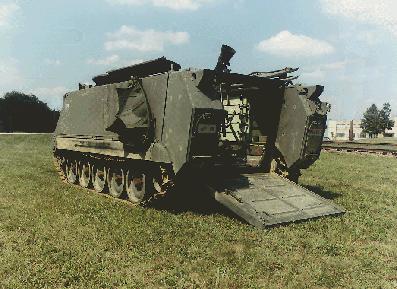 The M121 120mm Battalion Mortar System (BMS) provides close-in and continuous indirect fire support to maneuver forces and can rapidly respond to the threat. This mortar system is being fielded to mechanical
infantry and armored units. The M121 will give rapid shoot and scoot support to the infantry forces. The M121 Mortar is mounted in a M1064 Armored Personnel Carrier (M113 family of vehicles) and will replace, one for one, the 4.2" Mortar. provides
The M121,along with its associated family of ammo, increases range, lethality, smoke obscuration effectiveness and improves safety over the M30 4.2 inch mortar, along with improved reliability and safety.
The M121 Mortar System consists of the following major components:
The M121 120mm Battalion Mortar System (BMS) provides close-in and continuous indirect fire support to maneuver forces and can rapidly respond to the threat. This mortar system is being fielded to mechanical
infantry and armored units. The M121 will give rapid shoot and scoot support to the infantry forces. The M121 Mortar is mounted in a M1064 Armored Personnel Carrier (M113 family of vehicles) and will replace, one for one, the 4.2" Mortar. provides
The M121,along with its associated family of ammo, increases range, lethality, smoke obscuration effectiveness and improves safety over the M30 4.2 inch mortar, along with improved reliability and safety.
The M121 Mortar System consists of the following major components:
- M298 Cannon Assembly (110 lbs)
- M191 Bipod Assembly (70 lbs)
- M9 Baseplate (136 lbs)
- Carrier Adaption Kit
The M-120 mortar, when fired, especially in the carrier configuration, produces a blast overpressure (impulse noise level) in excess of the allowable limits. Operators subjected to this blast overpressure could have suffered permanent hearing loss if this health hazard had not been identified. The health hazard assessment performed on this system recommended that
- mortar crew members and soldiers in the immediate firing area be informed about the risk of hearing loss from exposure to the noise generated by mortar firing,
- mortar crew members wear properly fitted E-A-R brand disposable earplugs,
- soldiers in the immediate vicinity of the mortar firing (within 200 meters) wear properly fitted hearing protection, and
- medical personnel verify the proper fit of earplugs and ensure that soldiers understand that failure to use the earplugs could result in permanent hearing loss.
Characteristics
Maximum Range..........7200 metersMinimum Range..........200 meters
Maximum Rate of Fire.........16 rounds/min (first minute)
Sustained Rate of Fire..........4 rounds/min
Contractor: Watervliet Arsenal
Procurement Type: Production
Previous Contracts: 5
Contract Type: Firm Fixed Price
Production Qty: 110
Scope: Full Scale Production
In 1988 Product Manager for Mortar Systems, selected Lockheed Martin Ordnance Systems as the research and development and initial production prime contractor for the 120mm mortar and ammunition. Lockheed Martin teamed with Soltam Limited of Israel in the Non-Developmental Item acquisition. Subsequently, the U.S. Army awarded Watervliet Arsenal all weapon production under the Arsenal Act competition with Martin Marietta.
Other key contractors and government facilities for this program are: Chamberlain Manufacturing Corporation of Scranton, Pa.; Loral Corporation of Archibald, Pa.; Armtec Corporation of Coachella, Calif.; Hercules Inc of Radford, Va.; Lockheed Martin Ordnance Systems at Milan Army Ammunition Plant of Milan, Tenn.; Red River Army Depot of Texarkana, Texas; Anniston Army Depot of Anniston, Ala.; and the Product Manager for the M113/M60 Family of Vehicles of Warren, Mich.
Approximately 1,191 M1064 carriers will be converted to the M121 BMS systems and 1,191 M121 mortas will be produced at a total cost of $108 million. Conversion ran to June 1998, and production of the M121 mortar ended in October 1996. Future enhancements to the system include an improved sight unit, improved smoke round, conventional and infrared illumination rounds, a full range training round and the M30 mortar ballistic computer. Proposed long-term enhancements include extended range precision guided munitions and a digital fire control system.


